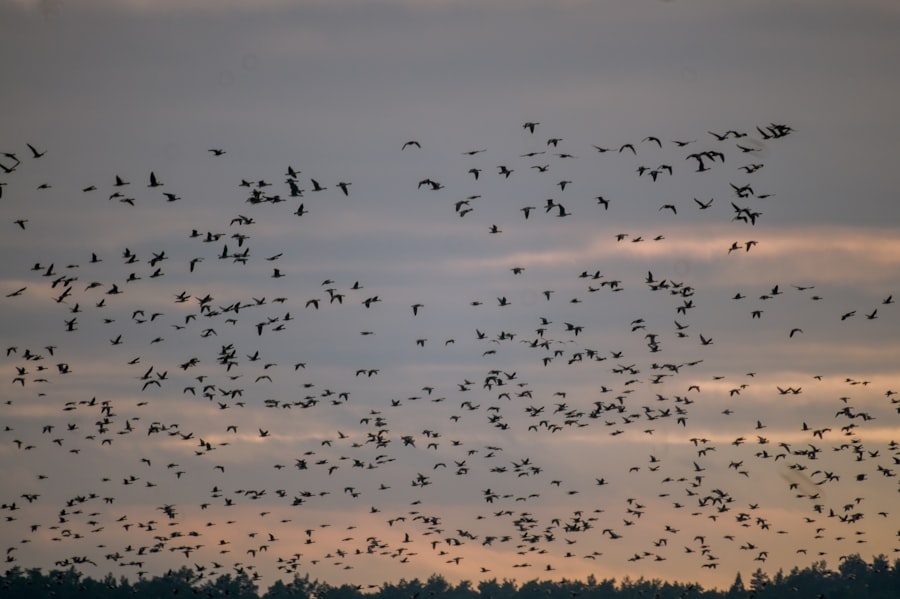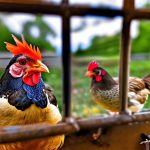Integrating a goose into a flock of chickens can be a beneficial practice for poultry keepers. Geese are naturally protective and may help deter predators, enhancing the overall security of the flock. Additionally, they can provide companionship and introduce a new element to the poultry environment.
However, successful integration requires careful planning and consideration of several factors. These include appropriate housing and space allocation, tailored feeding and nutrition programs, and addressing potential health and safety concerns. This article will examine the advantages of keeping geese with chickens, while also discussing the necessary precautions and strategies for effectively incorporating a goose into an existing chicken flock.
Table of Contents
- 1 Benefits of Keeping a Goose with Chickens
- 2 Considerations for Keeping a Goose with Chickens
- 3 Housing and Space Requirements for a Goose and Chickens
- 4 Feeding and Nutrition for a Goose and Chickens
- 5 Health and Safety Concerns when Keeping a Goose with Chickens
- 6 Tips for Introducing a Goose to a Flock of Chickens
- 7 FAQs
- 7.1 Can geese and chickens live together?
- 7.2 Do geese and chickens get along?
- 7.3 What are the benefits of keeping a goose with chickens?
- 7.4 Are there any drawbacks to keeping a goose with chickens?
- 7.5 How much space do geese and chickens need when kept together?
- 7.6 What should I consider before keeping a goose with chickens?
Key Takeaways
- Keeping a goose with chickens can provide several benefits for both species, including increased protection, companionship, and pest control.
- When considering keeping a goose with chickens, it’s important to take into account the size and temperament of the goose, as well as the space and housing requirements for both species.
- Providing adequate housing and space for a goose and chickens is essential for their well-being, including access to shelter, nesting areas, and outdoor space.
- Feeding and nutrition for a goose and chickens should be carefully managed to ensure that both species receive the appropriate diet and access to clean water.
- Health and safety concerns when keeping a goose with chickens include potential aggression from the goose, as well as the risk of disease transmission between the two species. Introducing a goose to a flock of chickens should be done gradually and with careful supervision to minimize stress and potential conflicts.
Benefits of Keeping a Goose with Chickens
Keeping Geese with Chickens: A Harmonious Union
Geese as Guardians
One of the primary advantages of keeping geese with chickens is the protective nature of geese. Known for their alertness and loud honking, geese can serve as a deterrent to potential predators, keeping the chicken flock safe and secure.
Companionship and Social Bonds
Geese are social animals that can form strong bonds with their chicken counterparts. They can often be seen foraging and grazing together, creating a harmonious and natural environment for both species. This companionship can add a sense of diversity to your poultry setup, creating an interesting and dynamic atmosphere for both the birds and their caretakers.
Enhanced Flock Safety
Geese have excellent eyesight and can alert the flock to any potential danger, helping to keep the chickens safe and secure. Additionally, geese are fiercely protective of their flock and will not hesitate to defend their chicken companions from threats, providing an added layer of security to your poultry setup.
Considerations for Keeping a Goose with Chickens

While there are many benefits to keeping a goose with chickens, there are also important considerations to keep in mind. One consideration is the temperament of the goose. While geese are generally protective and nurturing towards their flock, they can also be territorial and aggressive, especially during breeding season.
It is important to carefully observe the behavior of the goose and ensure that it is compatible with the chickens before introducing them. Another consideration is the space requirements for both geese and chickens. Geese are larger birds and require more space to roam and graze compared to chickens.
It is important to provide adequate space for both species to prevent overcrowding and potential conflicts. Additionally, geese have different dietary needs compared to chickens, so it is important to consider their nutritional requirements when planning their feeding regimen.
Housing and Space Requirements for a Goose and Chickens
When keeping a goose with chickens, it is important to provide adequate housing and space for both species. Geese require more space compared to chickens, as they are larger birds and need room to roam and graze. A spacious outdoor area with access to water is essential for geese to thrive.
Additionally, geese prefer to have access to water for swimming and bathing, so providing a small pond or shallow pool can greatly benefit their well-being. In terms of housing, it is important to provide separate sleeping quarters for the geese and chickens. Geese prefer to nest on the ground, while chickens typically roost in elevated areas.
Providing separate nesting areas can help prevent potential conflicts between the two species. It is also important to ensure that the housing is secure and predator-proof to keep both the geese and chickens safe from harm.
Feeding and Nutrition for a Goose and Chickens
Feeding and nutrition are important considerations when keeping a goose with chickens. Geese have different dietary needs compared to chickens and require a diet that is higher in protein and lower in calcium. It is important to provide a balanced diet for both species to ensure their health and well-being.
Additionally, geese require access to water for swimming and bathing, so it is important to provide a shallow pool or pond for them to fulfill this natural behavior. When feeding both geese and chickens, it is important to monitor their intake and ensure that each species is receiving the appropriate nutrients. Providing separate feeding areas can help prevent competition for food and ensure that each bird is receiving an adequate amount of feed.
It is also important to provide access to grit for both geese and chickens, as it aids in digestion and helps them process their food effectively.
Health and Safety Concerns when Keeping a Goose with Chickens

Disease Transmission and Biosecurity
One of the primary concerns is the potential transmission of diseases between geese and chickens. To mitigate this risk, it’s essential to monitor the health of both species closely and implement good biosecurity measures to prevent the spread of disease.
Veterinary Care and Health
Regular veterinary care is vital for both geese and chickens to ensure their overall health and well-being. This includes regular check-ups, vaccinations, and prompt treatment of any health issues that may arise.
Aggression and Conflict Prevention
Another important consideration is the potential for aggression between geese and chickens. While geese are naturally protective of their flock, they can also be territorial and aggressive, especially during breeding season. It’s crucial to carefully observe the behavior of both species and intervene promptly if any conflicts arise. Providing adequate space and enrichment can help prevent potential conflicts between geese and chickens.
Tips for Introducing a Goose to a Flock of Chickens
Introducing a goose to a flock of chickens requires careful planning and consideration. One tip for successful integration is to gradually introduce the goose to the flock over a period of time. This can help prevent potential conflicts and allow the birds to become familiar with each other’s presence.
It is also important to provide separate feeding areas for both species to prevent competition for food. Another tip is to provide adequate space and enrichment for both geese and chickens. This can help prevent boredom and potential conflicts between the two species.
Providing access to water for swimming and bathing can also greatly benefit the well-being of the geese. Additionally, it is important to monitor the behavior of both species closely and intervene if any conflicts arise. In conclusion, keeping a goose with chickens can be a rewarding experience that provides several benefits for poultry enthusiasts.
However, there are important considerations to keep in mind when integrating a goose into a flock of chickens, including housing and space requirements, feeding and nutrition, as well as health and safety concerns. By carefully planning the introduction and providing adequate care for both species, it is possible to create a harmonious environment where geese and chickens can thrive together.
If you’re considering keeping a goose with your chickens, it’s important to provide adequate housing for both species. A well-designed chicken coop, such as an A-frame chicken coop or a coop with a solid floor, can provide the necessary space and protection for your birds. For more information on building the perfect coop for your poultry, check out this helpful article on A-Frame Chicken Coop.
FAQs
Can geese and chickens live together?
Yes, geese and chickens can live together in the same coop or yard. They can coexist peacefully as long as there is enough space and resources for both species.
Do geese and chickens get along?
In general, geese and chickens can get along well. However, it’s important to introduce them to each other gradually and provide enough space for both species to avoid any potential conflicts.
What are the benefits of keeping a goose with chickens?
Keeping a goose with chickens can provide several benefits. Geese can act as natural protectors, alerting the flock to potential threats and predators. They can also help keep the area clean by eating insects and weeds.
Are there any drawbacks to keeping a goose with chickens?
One potential drawback of keeping a goose with chickens is that geese can be more aggressive than chickens, especially during mating season. Additionally, geese may require different dietary needs compared to chickens.
How much space do geese and chickens need when kept together?
When keeping geese and chickens together, it’s important to provide enough space for both species to roam and forage. A general guideline is to provide at least 4 square feet of space per chicken and 20 square feet per goose.
What should I consider before keeping a goose with chickens?
Before keeping a goose with chickens, consider the space available, the temperament of the individual birds, and their dietary and housing needs. It’s also important to monitor their interactions and provide separate areas if any conflicts arise.
Meet Walter, the feathered-friend fanatic of Florida! Nestled in the sunshine state, Walter struts through life with his feathered companions, clucking his way to happiness. With a coop that’s fancier than a five-star hotel, he’s the Don Juan of the chicken world. When he’s not teaching his hens to do the cha-cha, you’ll find him in a heated debate with his prized rooster, Sir Clucks-a-Lot. Walter’s poultry passion is no yolk; he’s the sunny-side-up guy you never knew you needed in your flock of friends!







